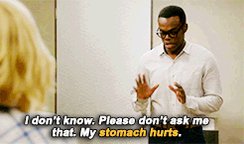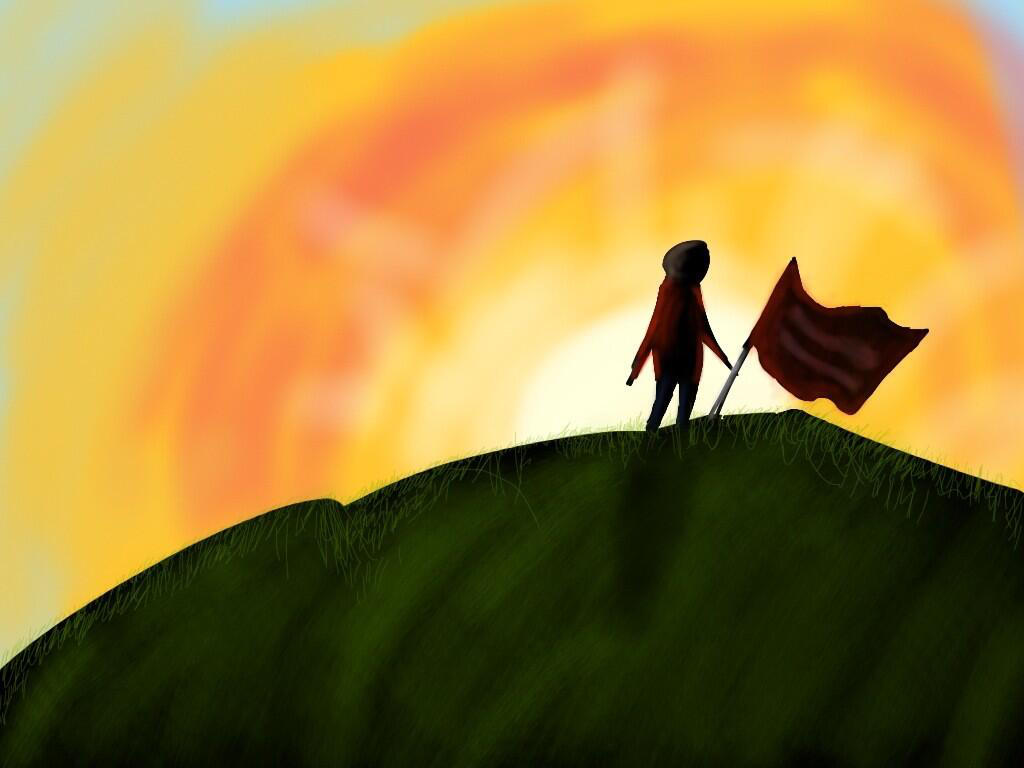Fast forward a few years, and I'm the dictionary definition of an over-thinker. My time is constantly spent in my head: worrying about things that haven't happened yet, reflecting on things that already have, and constantly, constantly worrying about what my next decision is going to be. If you've seen The Good Place, my friends call me Chidi, because every decision is a nightmare of pros and cons and opportunity costs.

Last semester, I began going to therapy to find ways to cope with my anxiety, particularly my social anxiety, which can vary from annoying to occasionally unbearable. It makes sense that an over-thinker might have social anxiety-- now instead of just dealing with my own variables, other people introduce thousands of variables which are neither predictable nor controllable, especially when it comes to their perception of me. For me, unfamiliar social situations are when the "classic" symptoms of anxiety come out: shaking, sweating, heart pounding, and coming up with worst case scenarios.
Because my actual anxiety attacks are so rare, I have a lot of trouble advocating for myself when I do get mental health help. I had tried going to my school's counseling center before and, by the time I was seen, I had rationalized a lot of my issues to the point where I couldn't convince myself that they were real. I thought I was just looking for a reason to be different, or get attention. This time was different, though-- I couldn't rationalize what was wrong with me, and why I was so exhausted and emotionally out of control.
Over the past few months, I've been working really hard with my therapist to deconstruct and improve my mental health. Since I often have very long stretches of time when my mental health is manageable, I've grappled with the insecurity that I'm not "anxious enough" to use my university's impacted individual counselling and sometimes have to reach to find obvious issues to maintain my validity. Even with these surface issues, therapy has been extremely helpful-- but they all felt like things I had already known. Only in my most recent session have I actually begun to get to the root of everything.
It turns out, not being able to shut my brain off wasn't completely normal (although it is becoming more normal in a world of distractions), and isn't healthy. It isn't just my mind wandering-- it's spiraling and nitpicking, and obsessing over my own thoughts. I described it to my partner as your mind racing when you're trying to fall asleep in the middle of the night, except all the time. It's at such a level of normalcy for me that I tie my identity to it-- my resume says "detail oriented" and "analytical." I joke that I'm always functioning on a background hum of anxiety. It makes me successful-- and constantly exhausted.
The problem comes when this overthinking begins to trap me in my own head: in my past, in my future, and in my routine. This can affect myself and others. I let my bedroom and my car become a disaster. I leave my weekends even more exhausted than when I started them. I'm unaware of my surroundings and become unusually clumsy, or get run over by a bike (true story). I'm unaware of my own emotions, negative or positive, because I compartmentalize them. I'm "dense" and have trouble knowing when my loved ones need me, and knowing what to do.
The funny thing is, looking back at my childhood, I can tell that I have always craved escaping my mind. When I was upset, my parents could take me outside to calm me down. I have always been attracted to performance arts, which forced me to be in the moment and mindful to my audience and my surroundings. I keep journals, which help me separate myself from my thoughts. This has helped me get better over time. The problem is, when life gets in the way, I get too busy to be mindful-- and then I never have the opportunity to check in with myself, and the vicious cycle continues.
Now my problem is that I know that I'm aware. I have to deliberately take myself out of my daze, which takes a lot of energy. It's going to take practice.
If you managed to read through this block of text, what I want you to take away is that everybody experiences mental health differently. My anxiety manifests in mind spirals, while others may experience anxiety attacks. We're all valid. If you feel like maybe something is different about you, and it's affecting you negatively, look into finding support.

